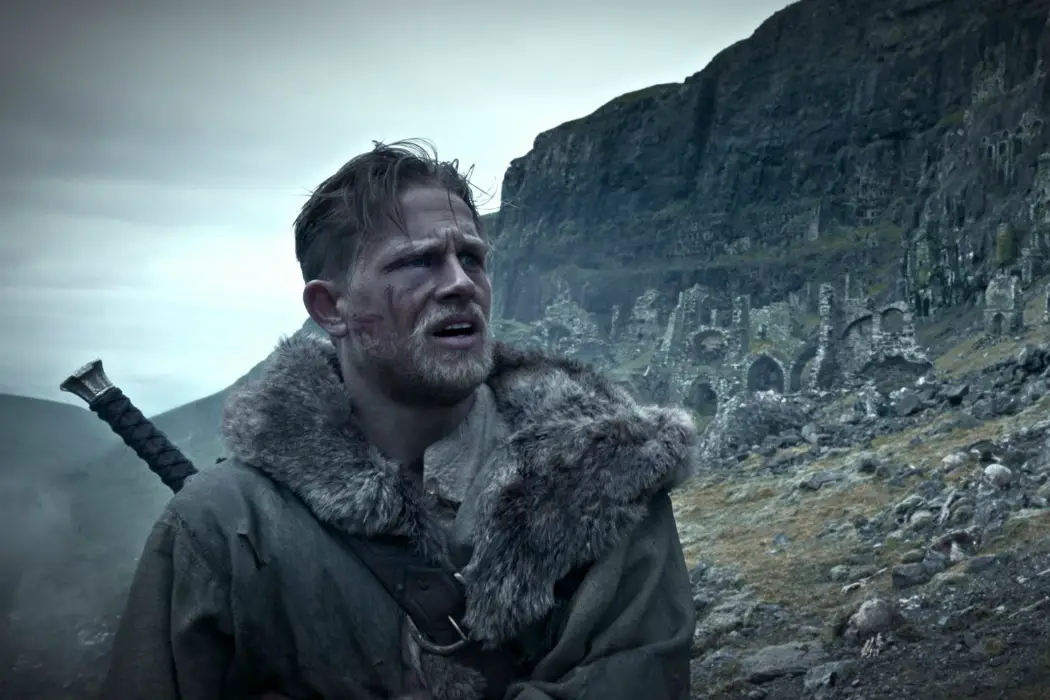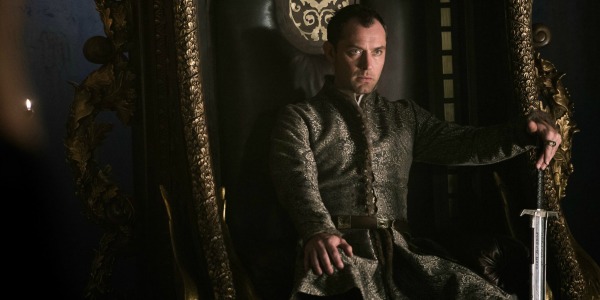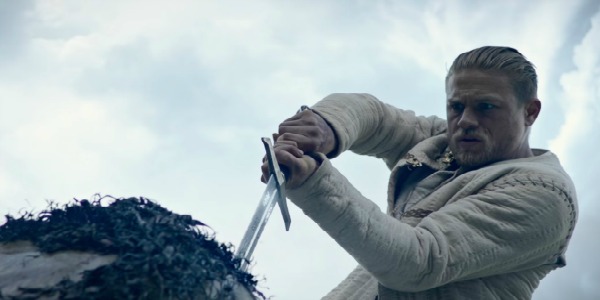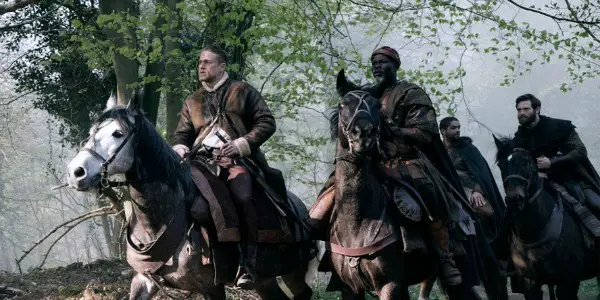KING ARTHUR: LEGEND OF THE SWORD: Lads Of The Round Table

Former film student from Scotland turned writer and film reviewer.
Guy Ritchie’s King Arthur was never going to be for the purists; those whose love of the once and future King come from Tennyson, Mallory, and T.H. White would likely find themselves racing out of the cinema in disgust, roughly around the time the 300 foot elephants mind-controlled by an evil mage are introduced.
Many reviews will cover the anachronisms, the blatant irreverence for historical accuracy, and the new spin on Arthur’s origin story (rather than a poor squire raised by a foster father and taught by Merlin, he is a lairy young roustabout raised in a brothel) and consequently cry out with rage- but then they would be missing the point.
As he did for Sherlock Holmes, Guy Ritchie once again puts his inimitable stamp on a British classic. The key is not to expect an homage, or a faithful retelling of a popular story, but rather to see how Ritchie can spin the style that has defined his oeuvre to different, more challenging backdrops. Don’t expect his version of Aladdin to be a straight-forward Disney film, either.
Lock, Stock, and One Magical Sword
Parts of the story do ring true to the famous texts on Arthur: he was born to Uther Pendragon, and raised in anonymity until the fateful day he pulled the sword from the stone and claimed his destiny. However, pretty much everything else here has been co-opted by Jody Harold and David Dobkin to suit the needs of their protagonists, such as the inclusion of Londinium, where a large part of the movie is set.
Almost right from the beginning we see Ritchie’s influence: an hubristic montage near the beginning sees the young Arthur come of age through a series of hyper-stylised clips featuring him learning to fight, to steal, and to become the leader of a clan of ne’er-do-wells; not much later comes a scene where Arthur and his friends must explain to a local constabulary what happened to a band of Vikings who were attacked – a scene which carries the usual brio for which Ritchie is known. It zips back and forth between the telling and the action, razor sharp dialogue rattled off at great speed interspersed between – both of these moments you could find in Lock, Stock, Snatch, RockNRolla, or indeed, Sherlock.
So fans of the ol’ geezer will get exactly what they came for: King Arthur: Legend of the Sword is funny, retains the confident swagger of Ritchie’s best work, and is, when it all boils down to it, mostly about a bunch of lads coming together for a right old barney.

How, then, does the rest of the film stack up? The answer is, unfortunately, not as well. Outside of Charlie Hunnam’s brash, soon-to-be King not many characters are given much in the way of development. One could argue the plot zips along at such a fast pace, and is mostly about Arthur’s journey, and so there isn’t much need for development, but a key scene featuring the death of one of Arthur’s band of geezers doesn’t quite carry the weight you feel it was intended to. This is mostly because we knew little of the character and so his death feels more like a convenient reason to galvanise Arthur than it is an indication of the high-stakes the boys are playing in.
Along the same lines sits Jude Law’s Vortigern, brother of the tragic Uther, and usurper of the throne. Although Law does bring a certain gravitas to the role, he was given little to work with; Vortigern is given no real motivation outside of simply wanting to be King, and scenes of him trying to hold on to his newly acquired Kingdom in the wake of Arthur’s rise reveal nothing of the character. In fact, there’s a very interesting sacrifice Vortigern must make, twice, in fact, that could have provided real insight into his character and given the audience a chance to understand him more. Instead, he comes off as little more than a pantomime villain barking rote cliches at his henchmen.
Àstrid Bergès-Frisbey, too, is criminally underused. Bergès-Frisbey was originally intended to be Guinevere, and she may well yet be, however she is listed in the credits solely as ‘The Mage’ and is given no real backstory. Any ostensible romance with Arthur, too, is reduced to a few minute scenes showcasing Arthur’s laddish persona and the mage’s stand-offishness.

The CGI, while impressive, occasionally suffocates the film, relying too heavily on flashy moments in place of character development.
Finally, story-structure suffers from Ritchie’s insistence on narrative tricks: at several moments the plot moves forward through the dialogue of characters as they explain exactly what’s going to happen; we are then shown these moments as the characters explain them. The next scene then places us squarely in action, but the momentum has stalled because the build up focused on dialogue rather than action. For an epic fantasy such as this, it’s a disappointing development; King Arthur: Legend of the Sword could well have been the next big summer tent-pole.
The Legend of the Legend
A notable absence in the film is Merlin. The wizard is mentioned a few times, but never seen; as one of the most beloved characters in Arthurian legend, he casts a long shadow. However his absence is for good reason: this is intended to be the first of a series of films, establishing a cinematic universe not unlike that over at Marvel.
On paper it’s a great idea. Thomas Mallory’s Le Morte d’Arthur could be argued as a precursor for Tolkien’s Lord of the Rings, and it’s true the legend of Arthur is ripe for long-form storytelling, especially in an age where Game of Thrones remains the most popular show on television. The problem here is in the execution. King Arthur: Legend of the Sword doesn’t have the narrative momentum to sustain the epic story it deserves. For all Jude Law’s intentions, Vortigern has little of the insidiousness of, say, Sauron, and so the world of Arthur never feels truly in peril, nor do the stakes feel high enough to convince a viewer Arthur is ever in real danger, or that this story warrants a sequel or two.

At the time of writing, King Arthur: Legend of the Sword‘s box office returns have been underwhelming. This may damage any possible chance Ritchie has at continuing the story, which is a shame because while the film may not be what any Arthurian enthusiast is looking for, it’s still great to see him in a new adventure.
Within the cannon of Arthur films that have preceded it, Ritchie’s King is middling ground. Others have done funnier versions – Monty Python and the Holy Grail – others have done it more dramatically – Excalibur – but this is by no means the worst interpretation of Arthur put to film.
A Tale Worth Telling
King Arthur: Legend of the Sword is almost exactly what you would expect from Guy Ritchie: a frenetically paced affair peppered with humour, hyper-stylised set pieces, and plenty of laddish behaviour. While its overloaded CGI effects and under-cooked character development may put some people off; those familiar, and comfortable, with the director’s back catalogue will find this enjoyable and even, on few occasions, worthy of its title.
There’s no doubt there is scope here for an epic series based on Arthurian legend, and we’ll likely see that in some form or other, but the question remains: is Guy Ritchie the one to deliver it?
There has been plenty of films and TV shows based on the adventures of King Arthur, Merlin, and the Knights of the Round Table. Which one is your favourite?
King Arthur: Legend of the Sword is released in the UK on May 19th, and was released on May 12th in the US.
Does content like this matter to you?
Become a Member and support film journalism. Unlock access to all of Film Inquiry`s great articles. Join a community of like-minded readers who are passionate about cinema - get access to our private members Network, give back to independent filmmakers, and more.













